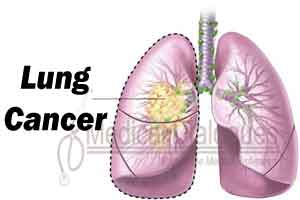- Home
- Editorial
- News
- Practice Guidelines
- Anesthesiology Guidelines
- Cancer Guidelines
- Cardiac Sciences Guidelines
- Critical Care Guidelines
- Dentistry Guidelines
- Dermatology Guidelines
- Diabetes and Endo Guidelines
- Diagnostics Guidelines
- ENT Guidelines
- Featured Practice Guidelines
- Gastroenterology Guidelines
- Geriatrics Guidelines
- Medicine Guidelines
- Nephrology Guidelines
- Neurosciences Guidelines
- Obs and Gynae Guidelines
- Ophthalmology Guidelines
- Orthopaedics Guidelines
- Paediatrics Guidelines
- Psychiatry Guidelines
- Pulmonology Guidelines
- Radiology Guidelines
- Surgery Guidelines
- Urology Guidelines
New Blood test for early detection of lung cancer

An initial report from the large, ongoing Circulating Cell-Free Genome Atlas (CCGA) study provides preliminary evidence that a new blood test may be able to detect early-stage lung cancer. This is one of the first studies to explore blood tests analyzing free-floating or cell-free DNA as a tool for early detection of cancer.
Having a blood test that can be done through a simple blood draw at the doctor’s office may improve lung cancer screening rates, but before such a test could be widely used, additional validation in larger data sets and in studies with people who have not been diagnosed with cancer would be needed.
Analysis of cell-free DNA from blood is already used to help choose targeted therapies but such “liquid biopsies” are used only for people with advanced lung cancer. Until recently there has been limited evidence to show cell-free DNA analysis may be feasible for early detection of lung cancer
The CCGA study has enrolled more than 12,000 of the planned 15,000 participants (70 percent with cancer, 30 percent without cancer).In this initial analysis, researchers explored the ability of the three assays to detect cancer in 127 people with stage I-IV lung cancer.
Three assays were designed to detect cancer-defining signals (mutations and other genomic changes) that could be used in an early cancer detection test:
- Targeted sequencing to detect non-inherited (somatic) mutations, such as single nucleotide variants and small insertions and/or deletions;
- Whole-genome sequencing (WGS) to detect somatic gene copy number changes;
- Whole-genome bisulfite sequencing (WGBS) of cell-free DNA to detect epigenetic changes.
Important findings:
- At 98 percent specificity, the WGBS assay detected 41 percent of early-stage (stage I-IIIA) lung cancers and 89 percent of late-stage (stage IIIB-IV) lung cancers.
- The WGS assay was similarly effective, detecting 38 percent of early-stage cancers and 87 percent of late-stage cancers
- The targeted assay detected 51 percent of early-stage cancers and 89 percent of late-stage cancers.
The initial results showed that all three assays could detect lung cancer with a low rate of false positives (in which a test indicates a person has cancer when there is no cancer).
Of the 580 samples from people without cancer at the time of enrollment in the sub-study, five (less than 1 percent) had a cancer-like signal across all three assays. Of those five participants, two were subsequently diagnosed with cancer (one with stage III ovarian cancer and one with stage II endometrial cancer) - highlighting the potential for such tests to identify early-stage cancers.
Among participants with lung cancer, the study found that more than 54 percent of the somatic (non-inherited) mutations detected in blood samples were derived from white blood cells and not from tumors. These mutations are likely the result of natural aging processes (so-called clonal hematopoiesis of indeterminate potential, or CHIP) and will need to be taken into account when developing blood tests for early detection of blood cancers.
Results are being verified by the researchers in an independent group of approximately 1,000 participants from CCGA as part of the same sub-study. After that the researchers will continue to optimize the assays, then validate them in an even larger data set from CCGA. More improvement is expected in assay performance with increased sample sizes.

Disclaimer: This site is primarily intended for healthcare professionals. Any content/information on this website does not replace the advice of medical and/or health professionals and should not be construed as medical/diagnostic advice/endorsement or prescription. Use of this site is subject to our terms of use, privacy policy, advertisement policy. © 2020 Minerva Medical Treatment Pvt Ltd